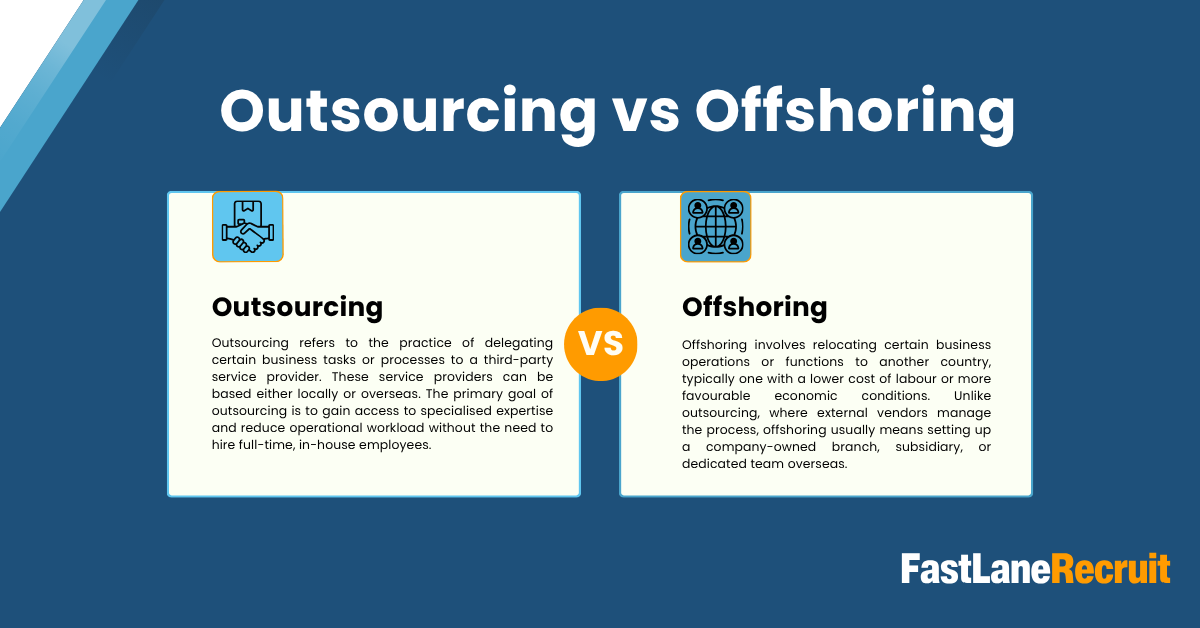In today’s dynamic and highly competitive global economy, companies in Hong Kong are increasingly turning to innovative workforce strategies to improve efficiency, reduce costs, and accelerate growth. Two of the most common approaches are outsourcing and offshoring. While these terms are often used interchangeably, they refer to fundamentally different business models that suit different needs and objectives.
This article provides a comprehensive comparison of outsourcing vs offshoring, their respective benefits and challenges, and how Hong Kong businesses can strategically leverage each. By understanding the key differences, organisations can make informed decisions that support long-term business sustainability.
Also Read: The Ultimate Playbook for Building and Integrating Offshore Teams
Content Outline
Key Summary
Outsourcing and Offshoring Are Distinct Strategies
While both aim to improve efficiency and reduce costs, outsourcing involves delegating tasks to third-party providers, whereas offshoring means relocating business functions to another country, often with internal oversight.
Outsourcing Offers Flexibility and Speed
Ideal for short-term or non-core business functions, outsourcing provides rapid access to specialised skills without the overhead of managing an in-house team.
Offshoring Provides Long-Term Cost Savings and Control
Best suited for strategic and high-volume operations, offshoring enables companies to build dedicated overseas teams, gain cost advantages, and maintain full control.
Choosing the Right Strategy Depends on Business Goals
Outsourcing is often better for SMEs seeking scalability and flexibility, while offshoring benefits businesses looking to establish permanent global capabilities.
A Hybrid Approach Can Maximise Efficiency
Combining outsourcing for specific tasks and offshoring for core functions can create a balanced, cost-effective workforce strategy.
Compliance and Data Protection Are Critical
Hong Kong businesses must consider data privacy laws, labour regulations, and international compliance when outsourcing or offshoring.
Partnering with Experts Like FastLaneRecruit Reduces Risk
FastLaneRecruit provides strategic guidance, recruitment expertise, and HR support to help businesses implement effective outsourcing and offshoring models with confidence.

What is Outsourcing?
Outsourcing refers to the practice of delegating certain business tasks or processes to a third-party service provider. These service providers can be based either locally or overseas. The primary goal of outsourcing is to gain access to specialised expertise and reduce operational workload without the need to hire full-time, in-house employees.
Common Outsourced Functions:
- Human Resources (e.g. payroll processing, benefits administration)
- Customer Support and Call Centres
- IT Support and Software Development
- Marketing and Content Creation
- Bookkeeping and Financial Reporting
- Recruitment and Staffing
Key Benefits of Outsourcing:
- Cost Efficiency: Outsourcing non-core functions allows companies to reduce fixed labour costs and overheads.
- Operational Flexibility: Businesses can scale resources up or down depending on project needs.
- Focus on Core Activities: Delegating time-consuming tasks frees up internal teams to concentrate on strategic growth areas.
- Access to Expertise: Tap into professional knowledge and industry-specific skills that may not be available internally.
However, outsourcing also requires careful vendor selection and effective communication to ensure consistent quality and accountability.
Also Read: Why Accounting Firms Should Outsource Accounting Tasks
What is Offshoring?
Offshoring involves relocating certain business operations or functions to another country, typically one with a lower cost of labour or more favourable economic conditions. Unlike outsourcing, where external vendors manage the process, offshoring usually means setting up a company-owned branch, subsidiary, or dedicated team overseas.
Common Offshored Functions:
- Manufacturing and Assembly
- Software and Application Development
- Data Processing and Entry
- Technical Support and Maintenance
- Business Process Operations (BPO)
- Research and Development
Key Benefits of Offshoring:
- Significant Cost Reduction: Offshoring enables companies to lower operational costs by leveraging economies of scale and affordable global labour.
- Greater Control: Companies retain full control over operations, team management, and internal processes.
- Access to Global Talent: Businesses can build specialised teams in regions with strong technical or industry-specific expertise.
- 24/7 Productivity: Time zone differences can be used to maintain round-the-clock productivity across global teams.
Despite these advantages, offshoring requires investment in infrastructure, local legal compliance, and managing remote workforce integration.
Also Read: How to Manage Offshore Teams for HK Companies
Outsourcing vs Offshoring: A Detailed Comparison
To help businesses in Hong Kong make the right strategic decision, the table below compares key aspects of outsourcing and offshoring:
| Aspect | Outsourcing | Offshoring |
| Definition | Delegating specific tasks to an external service provider | Relocating business functions to a foreign country |
| Ownership | Tasks handled by a third-party provider | Tasks handled by an overseas team owned or managed by the business |
| Cost Structure | Variable costs based on project/service agreements | Fixed and ongoing operational costs with potential savings |
| Location Flexibility | Domestic or international | Always involves international operations |
| Control & Oversight | Limited, dependent on vendor agreements | High, with full operational control |
| Setup Complexity | Low setup complexity, fast implementation | Requires investment in legal, HR, and infrastructure |
| Scalability | Easily scalable through service contracts | Scalable, but requires internal planning and resources |
| Security & Confidentiality | Risk managed through vendor agreements | Enhanced control over data and IP protection |
| Integration | Typically external to the business | Integrated as part of the company structure |
| Best Suited For | Short-term, specialised or non-core functions | Long-term, high-volume or strategic functions |
Strategic Considerations for Hong Kong Companies
When to Choose Outsourcing:
Outsourcing is ideal for businesses looking to streamline non-core functions quickly and affordably. It is especially beneficial for small to medium-sized enterprises (SMEs) in Hong Kong that require flexibility without significant capital investment. For instance, a company may outsource its recruitment process to improve hiring efficiency without building an internal HR department.
When to Choose Offshoring:
Offshoring is better suited for businesses planning to scale operations and establish long-term overseas capabilities. Companies in sectors such as technology, logistics, manufacturing, and financial services often offshore parts of their operations to reduce costs and access a broader talent pool while maintaining control over core processes.
For example, a Hong Kong-based fintech company might offshore its software development to Malaysia, where there is a strong pool of IT talent at a lower cost compared to hiring locally.
Also Read: How to Effectively Hire and Manage Remote Employees: A Comprehensive Guide
Combining Outsourcing and Offshoring
Many modern companies adopt a hybrid approach, using both outsourcing and offshoring to optimise different areas of the business. This blended model enables companies to benefit from the speed and flexibility of outsourcing while building long-term strategic capability through offshoring.
For example:
- Outsourcing recruitment services to a local agency like FastLaneRecruit
- Offshoring back-office operations or IT support to a nearshore or offshore team
This strategic mix helps companies reduce risk, maximise ROI, and maintain business agility in a competitive environment.
Also Read: Case Study: How an Hong Kong Accounting Firm Set Up a Remote Team in Malaysia
The Legal and Compliance Landscape in Hong Kong
When engaging in outsourcing or offshoring, Hong Kong businesses must be aware of:
- Data Protection Regulations (such as PDPO)
- Labour Laws and employment standards
- Cross-border tax compliance
- Intellectual Property Protection
Partnering with experienced service providers ensures full compliance with local and international regulations, reducing exposure to legal or reputational risks.
How FastLaneRecruit Supports Your Workforce Strategy
At FastLaneRecruit, we specialise in helping businesses in Hong Kong navigate the complexities of outsourcing and offshoring. Our tailored recruitment and HR solutions support you through:
- Strategic workforce planning
- Recruitment process outsourcing (RPO)
- Talent acquisition for offshore operations
- Onboarding, payroll, and HR compliance support
We bring in-depth knowledge of Hong Kong’s regulatory framework, talent market, and regional workforce trends to deliver solutions that align with your growth strategy.
Make the Right Move with FastLaneRecruit
Choosing between outsourcing and offshoring is a critical decision that depends on your business goals, internal capacity, and long-term vision. With FastLaneRecruit as your partner, you gain access to expert insights, qualified talent, and scalable solutions that drive business success in Hong Kong and beyond.
Contact our team today to discuss how outsourcing or offshoring can help your company expand efficiently, reduce costs, and stay ahead in a rapidly evolving business landscape.


